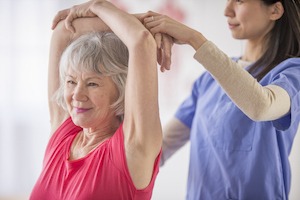Written by Geena Graham
The benefits of maintaining bone health as you age are much more than cosmetic. Deteriorating bone health can lead to poor posture that can affect your health, wellness and overall mobility. Elderly poor posture can create back pain, headaches, joint pain and stiffness in you muscles, and it can also affect your breathing, digestion, alertness, blood flow, circulation, and overall organ function. Therefore, maintaining good posture will not only keep you looking youthful as the years go, but it will also keep your body healthy and strong.
Eating healthy
Calcium is a big part of keeping our bones healthy and strong, nourishing our bodies and maintaining our posture. It is important to eat a well-balanced diet with plenty of calcium. Women need to be particularly careful to get enough calcium and vitamin D in their diet as they age. It is recommended that women age 19 to 50 years get 1,000 milligrams of calcium daily. For older women, 1,200 milligrams of calcium per day is recommended.
Eating calcium-enriched foods is the best way to get enough calcium in our lives, and maintain strong bodies as we age. Leafy greens such as collard greens and kale are calcium superstars, as are broccoli, soybeans and bok choy. Canned sardines, salmon and shrimp are also great sources of calcium, according to the National Osteoporosis Foundation.
Vitamin D is also essential for bone health, and can help maintain muscle health as we age as well. And the good news is, most of us get enough vitamin D from our food and sunlight exposure, meaning taking supplements isn't necessary. The recommended dietary intake for vitamin D is 600 IU a day for women up to age 70, and 800 IU for women older than 70. The National Institute of Health recommends eating fatty fish, fish liver oil, beef liver, egg yolks and cheese for vitamin D. Vitamin D can also be found in fortified foods, such as milk, orange juice, breakfast cereal and yogurt.
Easy Exercises to Strengthen Your Core
Exercise is one of the best ways to keep good posture as we age, and to slow or prevent problems with the muscles, joints, and bones. The older we get, the more thin and brittle our bones become, but the good news is that any type of exercise or movement helps to combat this by strengthening the bones. As the muscles pull on the bones during exercise and movement, the bones actually remodel themselves and become stronger. Therefore, developing an exercise routine as you age can help you maintain balance, flexibility, strength and stamina.
Gentle exercises such as walking, stair climbing, and swimming can be just as beneficial for the bones and the body as we age as weight lifting and body-weight strengthening exercises, so choose an exercise that you enjoy and that you can be realistic about commuting to.
Your core muscles form the foundation of good posture, and a strong core can have many other benefits and allow for a longer, more enjoyable life. Focusing specifically on the transverse abdominus muscle group can help to keep your spine upright and avoid stooping posture and back pain. Pilates and yoga are great ways to build up the strength of your core. Start practicing yoga gradually and listen to how your body responds and make sure your yoga teacher is sensitive to your needs and abilities. Restorative and Yin Yoga are good classes to start in if you're a beginner. These types of classes focus on stretches and mediation. In addition to helping to increase body awareness and core strength, yoga is an exceptional way to build and maintain flexibility and strengthen muscles throughout your body. And you can begin at ANY age.
Talk to your health care provider before starting a new exercise program.
Talk to Your Doctor
The medications you take could also be having an affect your posture. Although these medications may keep your health issues at bay, they could also be having some negative affects on your bones and muscles. Talk to your doctor about your posture, and ask if any of your medications or the dosages could be negatively impacting your posture and bone strength.
If you are concerned with your posture, or an overall lack of strength in your body, ask your health care professional for a bone mineral density scan that can detect osteoporosis. Detecting these problems early is important because there are medications out there that can stop or reverse bone density loss, strengthen your back, and improve your posture.
In conclusion, your body dramatically changes as you age, but you can fight back by eating a healthy, calcium and vitamin D rich diet, maintaining a gentle exercise routine, working with your doctor, and maintaining a positive and active lifestyle to not only strengthen your body, but also improve your posture, reduce your health risks, and achieve health and wellness as you age.
If you or your loved one could use help staying active and healthy as you age, consider bringing a qualified care provider into your home. American In-Home Care always refers qualified, screened, care providers that are compassionate and ready to help with services like meal preparation, diet monitoring, and mobility assistance. Contact us at 1-844-505-0004 to schedule your free in-home consultation to discuss which care options are right for you and your family.


